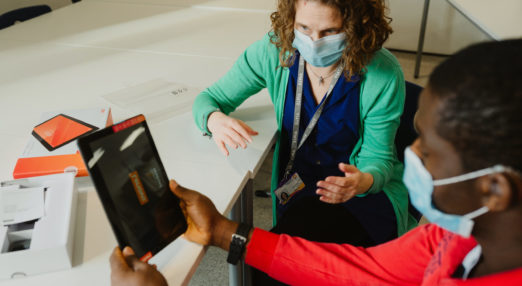Data poverty research scheme launched to tackle cost-of-living crisis
Good Things Foundation and Nominet launch a new scheme to tackle data poverty, and help reduce the cost of living.
Good Things Foundation and Nominet have announced a new scheme to help end data poverty, and reduce the cost of living.
Three new Fellowships – which are part of their Data Poverty Lab – will provide funding of £12,000 to allow people to explore innovative interventions with the aim of designing effective solutions to tackle data poverty.
84% of benefits recipients are unaware that they already qualify for cheaper broadband deals
The announcement comes on the back of significant rises in inflation, which are pushing more people into data poverty, and forcing families to make difficult choices about where to spend their money.
New research from Ofcom shows that 84% of benefits recipients are unaware that they already qualify for cheaper broadband deals. The Fellowships are designed to both amplify existing interventions and to highlight new ideas.
The Fellowships will explore three key themes which emerged from the Data Poverty Lab’s initial research:
- What community-led solutions to data poverty are emerging, and how could these be scaled regionally or nationally?
- How do we talk about data and data poverty?
- Should internet access be viewed as an essential utility, a human right, or something else?
Successful applicants will receive an award of up to £12,000 and produce a report on one of the three themes. This process is crucial to design effective, sustainable solutions to data poverty, to increase the effectiveness of existing interventions, and to reduce the cost of living in our digital age.
The Covid-19 pandemic exposed and exacerbated the digital divide, with the pandemic accelerating the digitisation of essential public services. In response to this shift, the Data Poverty Lab has worked closely with people with lived experience to ensure that we design fair, equitable interventions.
"With the rising cost of living very much on most people’s minds we’re delighted to announce this timely new scheme to help tackle the specific challenges of digital poverty in the UK. The three Data Poverty Lab Fellowships, funded by Nominet, will enable experts to drill down into the problems experienced in order to pinpoint them and help create suitable, credible and sustainable solutions. The barriers that prevent families from accessing education, financial, health and job support online, must be broken down, and the outcomes of this scheme will make a significant impact in achieving that aim.”
“We are really pleased to be continuing to partner with the Good Things Foundation to end digital poverty in the UK. Despite being in the aftermath of a pandemic, during which the disadvantages of digital poverty became more pronounced than ever, we are finding that data poverty continues to affect millions of individuals and households across the UK. Like other forms of poverty, it limits access to essential services, access to education, and with it brings both immediate and long-term impacts. This is why we must consider every aspect of data poverty and leave no stone unturned in our efforts to ensure we bring equality of experience and access to the digital world."
Individuals interested in applying for a Data Poverty Lab Fellowship should visit www.goodthingsfoundation.org/data-poverty-lab/fellowship/ or contact our Policy and Research Officer, Tom McGrath, by emailing tom.mcgrath@goodthingsfoundation.org. Applications are open from 23 February to 20 March 2022.


